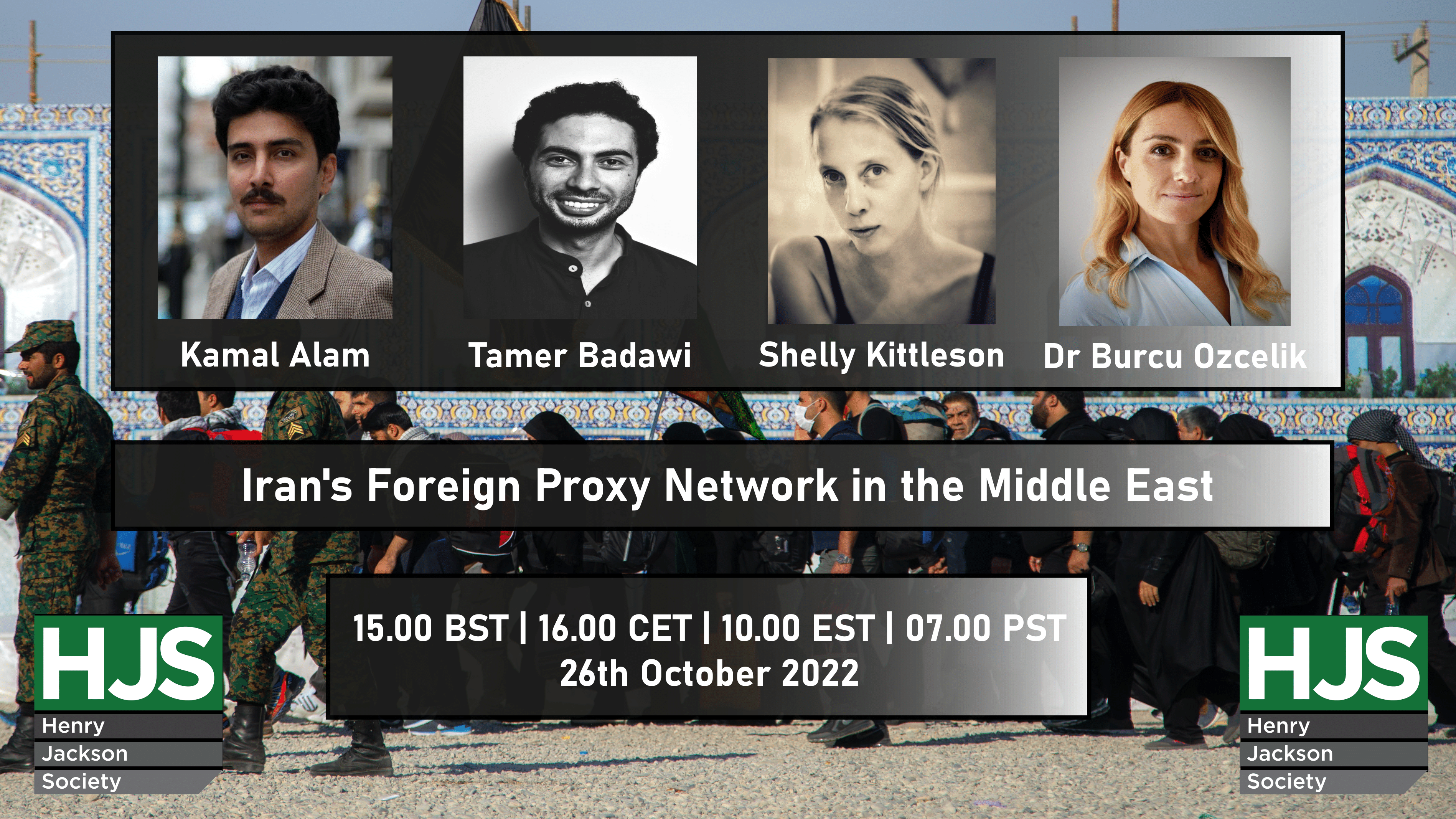Iran’s Foreign Proxy Network in the Middle East

- This event has passed.
Iran’s Foreign Proxy Network in the Middle East
26th October 2022 @ 3:00 pm - 4:00 pm

Iran’s proxy politics and its strategic deployment of an expanding number of allied groups throughout the Middle East continues to destabilise the region. Iran’s motives and approaches are complex and resilient as Tehran strives to maintain its military and security influence across its borders through both armed and political affiliates. Proxies have unquestionably strengthened Tehran’s standing in a geopolitical standoff in the Middle East. Now at a critical crossroads domestically, what is the likely direction of Iranian foreign policy toward its neighbours?
As intra-Shiite conflict grows in Iraq amid the government formation crisis, does the future of Iraq depend on the balance of power with Iran? How is Iraqi Kurdistan affected by Iranian encroachment? What can the West do to support democratic processes in Syria and continue to support the fight against ISIS cells?
To answer these and other questions, The Henry Jackson Society is delighted to welcome you to the online event to examine Iran’s motives and the extent of its ongoing influence across its borders through both armed and political affiliates.

Kamal Alam is a non-resident senior fellow at the Atlantic Council’s South Asia Center. He has a special focus on Pakistan’s relationship with Syria, Jordan, and Turkey.
He was the Pakistan defence fellow at the Royal United Services Institute in London from 2015 to 2019. He has also worked at the Damascus Center for Strategic Studies. He lectures at various military staff colleges in the Arab world with a particular focus on Syrian military history. For three years he was part of the Pakistani and British armies’ COIN (Stabilization) dialogue looking at the lessons learned on UK-Pakistani defence diplomacy in the Middle East. He writes regularly on Syria’s relationship with Iran, Turkey and the region for War on the Rocks, National Interest, Middle East Eye and the Royal Society for Asian Affairs Journal.

Tamer Badawi is an analyst and consultant focused on security and politics in Iraq and the wider region. He is a Ph.D. Candidate and Teaching Assistant at the University of Kent’s School of Politics and International Relations (Canterbury, UK) where he researches paramilitary groups in Iraq. Tamer was previously a Policy Leader Fellow at the European University Institute. He worked in think tanks and journalism for the past ten years.

Shelly Kittleson is a Baghdad-based journalist who has reported from several countries across the Middle East and Afghanistan for the past decade. Her reporting, analyses, and photos have been published by many international, US, and Italian publications. She has embedded with and interviewed many local armed forces on frontlines across Iraq, including the official security forces and Iran-linked armed groups during the fight against the Islamic State.

Dr Burcu Ozcelik holds a PhD in Politics and an MPhil in Development Studies from the University of Cambridge and subsequently held the prestigious Leverhulme Early Career Fellowship at the Department of Politics and International Studies where she taught Conflict, Peacebuilding, and the Politics of the Middle East.
Dr Ozcelik’s research primarily focuses on the international relations of the Middle East, non-state armed actors and peacebuilding. She has extensive experience with Turkey, Iraq, Syria, and Israel.
Dr Ozcelik grew up mainly in the US and lived in numerous countries including Turkey, Saudi Arabia, China, Iraq, and Belgium before moving to Cambridge. She is a native English speaker and is fluent in Turkish.
Prior to joining HJS, Dr Ozcelik was an associate fellow at the International Institute for Strategic Studies (IISS) and has previously worked for the United Nations Development Programme (UNDP) in Turkey and in civil society, focusing on democracy and human rights. In addition to her scholarly articles, Dr Ozcelik’s research has been widely published in journals including War on the Rocks, The National Interest, Foreign Affairs, New Lines Magazine, Middle East Eye, the Royal United Services Institute and Carnegie Endowment for International Peace.
Dr Ozcelik also acted as contributing editor of The politics of race and racialisation in the Middle East (Routledge 2022) and authored An Analysis of Seyla Benhabib’s The Rights of Others: Aliens, Residents and Citizens (Routledge and Macat 2017).
***
EVENT SUMMARY
The Henry Jackson Society was delighted to welcome Kamal Alam, Shelly Kittleson and Tamer Badawi for a discussion on the direction of Iranian foreign policy, focusing on its future and on developments in Syria and Iraq. Burcu Ozcelik began by introducing the speakers. Shelly Kittleson then started the discussion by outlining what she had witnessed on the ground in the Middle East, including the grievances against the PKK, whilst stressing the need for independent journalists on the ground to ensure accurately reported news.
Tamer Badawi then emphasised the notable change to how Iran and its allies have operated in the past, with main groups now launching attacks without claiming them, and Iran directing and launching attacks without having to rely on a local alliance within Iraq. Kamal Alam explored the importance of Syria and Iran’s alliance, whilst highlighting the significance of their ideological differences. Finally, the speakers answered questions on Iraqi-Kurdistan, whether GCC’s will move toward Pakistan as Iran approaches possession of a nuclear weapon, and the impact of current protests on Iran’s foreign relations.


